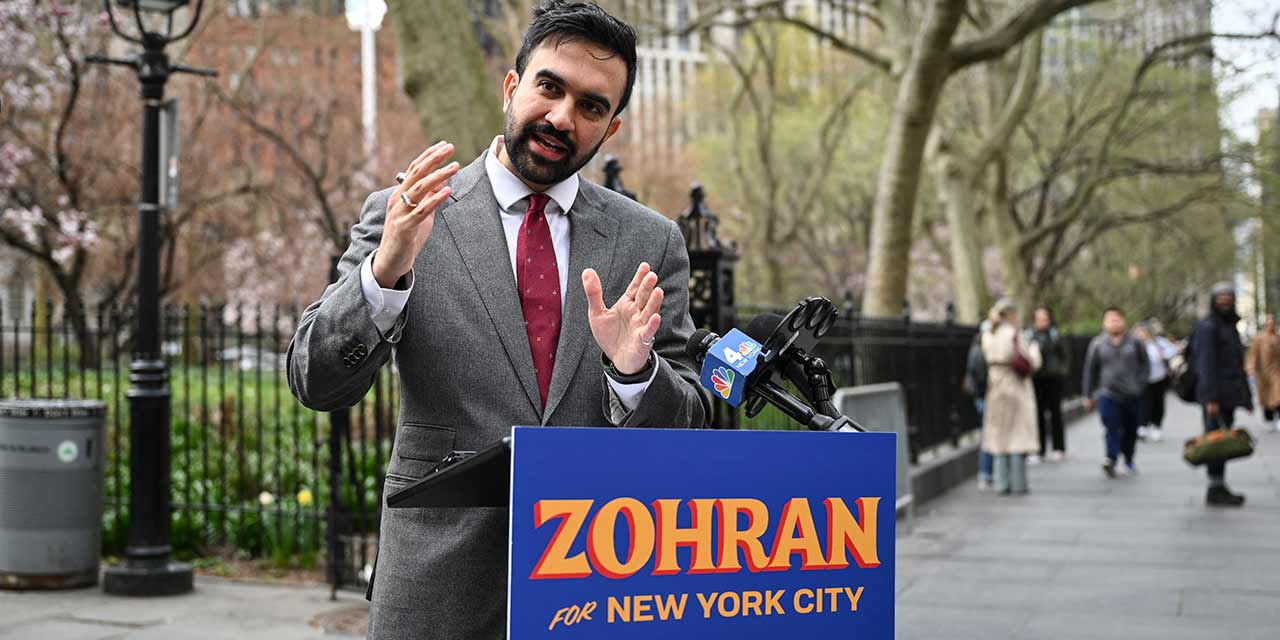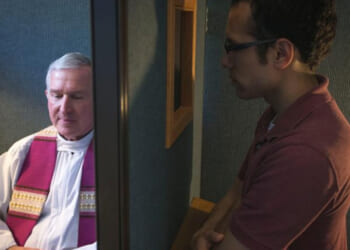
Charles Fain Lehman, Jesse Arm, John Ketcham, and Rob Henderson discuss New York City mayoral candidate Zohran Mamdani’s latest proposal, an HHS review of medical interventions for children with gender dysphoria, and why taking advice from younger generations is never a good idea.
Audio Transcript
Charles Fain Lehman: Welcome back to the City Journal Podcast. I’m your host, Charles Fain Lehman, a fellow at the Manhattan Institute and senior editor of City Journal. Joining me today on our panel are Jesse Arm, director of all things politics at the Manhattan Institute and polling. I got that right this time, Jesse. I didn’t slip up. John Ketcham, who directs all things cities at the Manhattan Institute. And our special guest today is Rob Henderson, senior fellow at the Manhattan Institute, prolific substacker, author of Troubled: A Memoir, he’s published all over the place. Thanks, thanks Rob for joining us on the panel.
Rob Henderson: Yeah, thanks Charles, great to be here.
Charles Fain Lehman: I want to jump right into our news of the day. We’re going to tell a little bit of a, you know, we’re the City Journal Podcast, so we’re going to do a little bit of a New York City focused story. A friend of the show, Zohran Mamdani, the self-professed socialist candidate for mayor, who looks likely to take second place in the Democratic primary in a few months, said in an interview recently that he wants to rehab unused retail space in New York City subways to serve as linking hubs to provide services to the homeless. This provoked, I think, more than a little surprise, but sort of a typical Zohran Mamdani story. I could sort of ask an illustrative question, but in my notes I just have the word “what?” So I’m going to ask that to John. John, what?
John Ketcham: Well, Zohran Mamdani is this inexhaustible well of bad ideas. And this is just the latest one. About 30 percent of New York City subway system’s retail stalls are vacant right now. But it’s not something the city controls. This is the MTA. And the MTA is constantly in need of money.
Charles Fain Lehman: Which is separate from the city, right?
John Ketcham: It’s separate from the city. The MTA is a state-controlled entity. Now, it’s constantly in need of funding, both for its operations and for its capital needs. I have a piece in the print New York Post today talking about a hidden tax that Kathy Hochul and the state legislature adopted to downstate payrolls. You don’t see it on your payroll, but employers pay it and it’s going to raise about $1.4 billion more for the MTA. And it’s still $3 billion short of its $68 billion capital plan.
The MTA constantly needs money and here we have 30 percent of vacant stalls. I say let’s rent them out even at modest rates to allow for economic opportunity and to put more eyes on the street or in this case in the subway system. The last thing New Yorkers want are more disturbed and homeless people in the subway system. And I think Mamdani’s proposal falls way short of where voters are on this one.
Charles Fain Lehman: Yeah, I want to sort of get at the politics of this, because part of what I find interesting about this race, why I think it’s more than a New York story, is that the fight in the Democratic primary for mayor of New York, and we’ve talked about this on the show, is sort of being fought between sort of a left-wing radical in Mamdani, who’s getting about 30 percent of the vote, and former Governor Andrew Cuomo, who has sort of painted himself as the moderate, will probably win the primary after Eric Adams dropped out, the current mayor dropped out of the primary, and is winning maybe 50 percent of the vote. We’ll see what the final runoff tally is. But, you know, Jesse, I’m curious, like, do you think that Mamdani thinks this is going to play well? Like, is this a winning issue? What’s, you know, how do you fit this into the broader political landscape?
Jesse Arm: Zohran Momdani is building a powerful broad-based coalition in this mayoral race. People who think it’s good, actually, to have more mentally ill homeless folks sleeping in the subway. Brooklyn socialists clad in Islamist scarves around their faces who enjoy shutting down Grand Central during the evening but never morning commute. And now, following yesterday’s all-important endorsement, fans of Ella Emhoff, Kamala Harris’s fashion model, nepo step-baby with, you know, cartoonish tattoos and proud armpit hair. Her endorsement is particularly surreal given that Mamdani and the Democratic Socialist Alliance, or Democratic Socialists of America, of which he’s a part, literally ran the Leave It Blank campaign last year aimed at encouraging Democratic voters not to vote for Harris over Trump. So I think the bottom line is that Mamdani is consolidating the lunatic lane. The DMV and the subway are already two of the most dysfunctional systems in New York because the government runs them. And Mamdani would like to expand that remit to where you live and where you buy groceries. So no wonder Cuomo is beating his progressive challenger by roughly 30 points. And that said, we could end up with a four-way general election here with Cuomo as the Democrat, Adams, the current mayor, is running as an independent, Curtis Sliwa as the Republican, and Mamdani on the Working Families Party line. And in that scenario, things that seem impossible today, like Mamdani becoming mayor, could suddenly become alarmingly plausible.
Charles Fain Lehman: So Rob, you’re recent transplant to New York City area. Welcome. But you you’ve, I think, written a lot about this sort of cultural phenomenon of the sort of group that Jesse is alluding to. I wonder if you, I mean, I don’t know how ready you are on the Mamdani campaign as a recent arrival, although you can vote as recent arrival in New York City, even if you’re not a citizen.
Rob Henderson: Do you need an ID?
Charles Fain Lehman: Do you need an ID? John will tell you.
John Ketcham: No, not at the point of voting, but the Court of Appeals actually struck down the non-citizen voting law that the City Council had passed and that Adams had allowed to become law without his signature. So it is not legal to vote in local elections as a non-citizen in New York State, thanks to a fairly progressive Court of Appeals as well. yeah.
Rob Henderson: Thank God. Thank God.
Charles Fain Lehman: Okay, you can vote, non-citizens can’t vote, but anyway, my question is like, what do you make of the durable power of what we were talking about as the Mamdani Coalition? Like, who are they, where do they come from, and why, do they continue to be a constituency that would cause somebody to go, I think that what we should do is turn vacant stores in the subway into homeless shelters.
Rob Henderson: Yeah, well, you’re right. As a recent transplant, you know, I’m a reluctant member of the rootless cosmopolitan elite. And so I arrived in New York knowing little about the local politics. So in preparation for this, I read a little about Mamdani. And yeah, he has a father, you know, well-resourced academic with impeccable educational credentials. Mom’s a filmmaker. And I read a little about Mamdani’s background. You know, he played cricket. He enjoyed moonlighting as a rapper.
And I thought that was kind of the ideal for a modern aspirational elite who you play cricket, but you also rap. Those two things, this blend of high and low culture and trying to be cool. noticed this guy. Well, anyway, he’s representative of what I like to call the luxury belief class. Someone who himself was raised in an abundance and affluence, almost certainly never had to experience direct fear, violence, addiction, all these kinds of things that a lot of ordinary New Yorkers face every day when they ride the subway or when they’re out in public or when they commute to their jobs. And he has all of these interesting, newfangled ideas that win him points and credit and applause from his voter base and people who grew up in similar circumstances as him. But there’s a reason, I think, why he’ll ultimately be unsuccessful.
He’s also young, probably naive, which may connect to the later topics that we’ll talk about in this discussion. And the way he carries himself. I read this interview with him in GQ. He says, my style is Uniqlo. He tries to present himself as an ordinary person with no references to the way that he grew up. And he also wears three rings. And I don’t trust any man who wears three pieces of jewelry like that on his fingers. I think a man, you should be limited to one, maybe two rings. You got your wedding ring. You get a ring for maybe tracking your health and fitness. But once you get to three rings, I think that should raise some eyebrows.
Charles Fain Lehman: Yeah, think I think, you know, part of which is up here is, and our Liena Zagar and I wrote about this a while back in the Big Apple newsletter, is if you look at the breakdown of mayoral primary polling, basically, Cuomo is winning everywhere except among college educated white voters in Brooklyn, and those people are breaking from Mamdani. And that’s like, you know, this gets to your luxury beliefs thesis, Rob, which is the like, there’s a class who is very happy to say that like we shouldn’t do fare enforcement on the buses and we should let the subways run out of control and we should have government run grocery stores, another Mamdani original idea, because that’s, you know, that that aligns with sort of like value priorities and we’re not really going to pay the costs associated with all of those things. So I’m, you know, to me, so much of this election is about sort of the tension between people who believe that stuff and people who don’t believe that stuff and would like the city government to provide basic services. I wonder if you think that that framing makes sense. If so, do you think the luxury belief class is a durable political constituency?
Rob Henderson: Yeah, well, government run grocery stores, that’s not quite original to Mamdani. I think that’s been tried before.
Charles Fain Lehman: Brandon Johnson wanted it too in Chicago.
Rob Henderson: But there’s no shortage of socialists who think they can reattempt that experiment and think they’ll be successful, perhaps because they’re so far removed from concrete reality and how these policies actually work. The luxury belief class I define as people who… These are ideas and opinions that confer status on the affluent while often inflicting costs on the less fortunate members of society. The luxury belief class, they’re sheltered from the consequences of their beliefs. Is it durable? It seems to be. It may have reached its zenith in 2020 to 2022. I think a lot of people are now publicly condemning a lot of these ideas. There will always be a highly educated, progressive aspirational elite that will attempt to distinguish themselves by holding unconventional or peculiar or bizarre views in the name of presenting themselves as compassionate or interesting or sophisticated, signaling their values. And they seldom pay a cost for when those beliefs actually do proliferate in the culture or get implemented in a policy.
John Ketcham: You mentioned the Brandan Johnson and the grocery store idea in Chicago. If I recall correctly, the city didn’t even apply for the state grants necessary to get the idea off the ground. So there’s a lot of posturing. There’s a lot of performative politics here. But when the rubber meets the road and you really have to perform for government, and it’s much more difficult. And those in positions of authority realize that, perhaps too late. But at that point, some of the political wins have been had and you know, because Zohran Mamdani also wants to 200,000 units of publicly subsidized housing, public housing. I mean, NYCHA’s track record is absolutely abysmal. It’s the worst housing stock in New York City. NYCHA is the worst landlord in New York City.
Charles Fain Lehman: The New York City Housing Authority?
John Ketcham: Yes, the New York City Housing Authority, excuse me. And to think that we could do it again and better this time, it beggars belief.
Charles Fain Lehman: I want to take us out, so I’m going to ask everybody in your professional opinion, what do you expect to be the craziest idea floated by a mayoral candidate this election season? Good or bad, it could be a crazy good idea or a crazy bad idea. John, I’ll put you on the spot.
John Ketcham: Well, Mamdani’s plan to freeze rents, I mean, that is just absolutely bonkers. We already see the consequences of the 2019 rent stabilization law expansion, which have led to things like landlords keeping their units vacant because it’s not economical to rehab the units. They can never recoup the costs of that renovation. So they keep them, quote unquote, “warehoused.” You have a critical housing shortage and yet you have thousands of units that are empty right now, because of our rent regulations. So freezing rents would just exacerbate the problem way worse. And that is an extremely radical idea. It’s never worked and it never will.
Jesse Arm: I have my own crazy good idea. We send Andrew Cuomo to Uniqlo. He cuts into the Mamdani vote. He looks fresh as hell. We avoid having a commie cricket player in Gracie Mansion.
Charles Fain Lehman: I’m fine with this. I will donate to the cause. Kitting out Andrew Cuomo in Uniqlo. Here’s the question is can Andrew Cuomo rap?
Jesse Arm: And do it before the tariffs kick in.
Charles Fain Lehman: Rob, your take? What do you think is the craziest idea?
Rob Henderson: I mean, you know, other than what’s been discussed, you know, as I mentioned, I read a little about Mamdani before. One of the things he said, this isn’t really sort of a policy proposal, but one thing he said was that he wouldn’t have sent in the police to the Columbia encampments, which blew my mind because I don’t know if he was unfamiliar with what was happening on that campus or if he was familiar and was just, you know, perfectly fine with it but people were being harassed and physically attacked. Obviously people are familiar with the vandalism and destruction of property but there was that famous story of the Columbia janitor who was trapped inside a building and these activists were preventing him from escaping. They were literally holding a guy hostage and Mamdani said, well that’s perfectly fine, we don’t need the police to deal with that. Clearly his idea of what’s acceptable is different from most people’s.
Charles Fain Lehman: Yeah, I’m going to take one out of left field, which is I’m going to go back to my favorite long standing proposal, which is to dredge the water south at the tip of Manhattan and increase the size of Manhattan substantially so that you can build more stuff on the island of Manhattan. I think, I feel like Zellnor Myrie or somebody has already embraced this, so I feel like that’s already happened, so it can’t be the craziest idea, but it’s my preferred crazy idea, so I’m going to go with it.
John Ketcham: Something like 20 percent of Manhattan is reclaimed land in that way. So not that crazy.
Charles Fain Lehman: You can keep it going. We can get more. You can have greater, greater Manhattan. I’m all for it. All right. Yeah. All right. I want to turn a little bit to the national news away from New York City, although we love New York City here on the City Journal Podcast.
Last week, Department of Health and Human Services released its comprehensive review of the science of gender transition for youth and adolescents. The review followed a Trump administration executive order, which asked for it. It found little evidence to support the use of medical interventions to address gender dysphoria in children and recommended further research into the topic including alternatives like comprehensive psychotherapy. So I want to, you we talk about this a lot at City Journal, the youth gender medicine debate. To me the interesting question is, is this going to matter? I mean the report is a 400 page brick. It’s, you know, I think fairly comprehensively written.
But, know, Jesse, you’re sort of the most real politic. Like, is this going to have an impact on the debate or is it already too polarized?
Jesse Arm: Well, the HHS review is a landmark moment, both as a rebuke to activist-captured medical institutions and as a vindication of the work of thinkers like our Manhattan Institute colleague, Leor Sapir, whose scholarship is deeply embedded throughout the review.
Critics are already shrieking about the anonymity of the authors or the reports proximity to the Trump administration, but these are total distractions. The science is the science and it mirrors what we saw in the Cass Review in the UK: low certainty evidence, serious risks, and an utter collapse of medical safeguards.
So where this review goes further is in its clarity. It ditches the euphemisms, no “assigned sex or gender,” no “gender affirming care” and names the ideology for what it is. It shows how American medical associations have become echo chambers for activist subcommittees and framing a complex clinical issue as a human rights crusade. Most importantly, it makes the ethical case that given what we know, pediatric medical transition is not just unsupported, it is indefensible. The report is not aimed at Twitter warriors or the American Academy of Pediatrics’s PR team. It’s for the real adults in the room, policymakers, institutional leaders, and physicians who are finally ready to break the silence on this gruesome and ugly practice which has become all too normalized in the United States.
Charles Fain Lehman: Yeah, wonder, get John and Rob’s opinions, so feel free to hop in. I think that there is some sense that there has been a backlash against the excesses of this stuff in the last administration. The excesses this stuff over the past 10 years even, conflicts over trans athletes in sports, conflicts over youth gender medicine.
But I wonder to what extent you guys think that can be sort of solidified, whether it’s possible to sort of come to a consensus or, you know, I’ve been thinking a little bit about, and they’re obviously not perfectly analogous, but there was this moment in the same sex marriage debate, the passage of Proposition 8 in California, where it seemed like same sex marriage was gone for a generation. You fast forward seven years, and it’s the law of the land. So, you know, I’m curious about, and again, they’re not perfectly analogous situations, and I’m curious about the overall dynamics. Is this an opportunity for consolidation of the sort of more reasonable position or is this just sort of like a byway along the road to sort of ultimate victory on the part of the sort of more extreme advocates?
John Ketcham: I think it is an important consolidation moment because it’s bringing the U.S. in closer conformity with the rest of the world and away from the affirmative model. The U.S. and Canada were global outliers in terms of using puberty blockers and cross-sex hormones as the first line treatments instead of psychotherapy. Countries like the U.K., Finland, Sweden, France, others, you know, these are Western European democracies. They’re progressive countries, they’ve all moved away from the affirmative model, and they’ve moved instead towards psychotherapy and psychosocial supports. So this report brings us closer into the global consensus and that’s very important. Also, it’s going to be used in courts. So right now, judges are apt to defer to the medical establishment, which as Jesse says, is quite captured. This will be, the HHS report will be used in amicus briefs, for example, to provide an alternative basis of authority to assist judges in their decisions on the appropriate standard of care, which really, the evidence shows, should not be gender-affirming care and over-medicalization through puberty blockers and cross-sex hormones.
Charles Fain Lehman: Yeah, Rob, I wonder if you would take on the broader trajectory.
Rob Henderson: Well, I think it always helps for people to have an authoritative document to point to. In some ways, it’s wild that we even need this. My understanding of that report is that one recommendation is to pivot away from hormonal treatments and surgical operations and more towards psychotherapy approaches to basically help depressed and anxious young adults, understand them better and come to terms with their current gender identity or to explore further whether those other options might be necessary. And this I’ve seen critics say is tantamount to conversion therapy of simply talking to a mental health professional about their conflicts. That is the manipulation of language, that this is conversion therapy, is surreal.
And I also find it just generally interesting this tacit acceptance that there is a biological basis to sex because otherwise you wouldn’t need surgical treatments or hormonal procedures or anything like that and simply talking to someone would be enough to affirm someone’s gender but that’s clearly not the case. You know, I’m hopeful. I think this is, the trans movement in general has been unpopular for a while. Many of you have probably seen the survey data that even among Democrats there’s sort of this growing skepticism of that movement of whether someone can actually change their biological sex or not. So I think this is a step in the right direction.
Charles Fain Lehman: Yeah, part of what I think about the, you know and again, you can think about marijuana legalization, and same-sex marriage, sort of the two big social movements that are pointed to as like, this is an opportunity, this is evidence of kind of dramatic social change very rapidly. But when I think about the debate that happened over same-sex marriage, it really came down to a dispute about harm. This is the position I’m sort of talking myself into, which is that, you know, but one side said there will be harm to children, the other side said there won’t be harm to children.
And the latter side sort of won the scientific dispute with sort of one very conspicuous exception that was vehemently fought over, And, you know, I think I think it became the sort of American political calculus was just like is you know, is there harm here? Americans, like most, want to be left alone, whereas in the in the youth gender medicine debate it becomes much easier to make an argument at harm, right? It’s like, we have relatively low-quality evidence of benefit and there’s just like a lot of evidence that putting kids on puberty blockers without any certainty about what the returns are is going to do bad things to their experience in puberty. And so that’s a relatively easy to win argument. I think there’s some benefit here in just laying that out. That said, I wonder, and this is a general question, to what extent do we think this evidence-based argumentation is going to be persuasive to the average voter? Is this insulating? I guess I’ve already sort of asked this, but you know, I think it’s a broader question of like, is it, given the willingness of the last administration to sort of make up evidence, to what extent do we think sort of picking the fight in this domain will be useful?
John Ketcham: The evidence here conforms to common sense. the potential harm here is iatrogenic harm, which means that a medical intervention itself can cause harm and the persistence of the symptoms. Kids go through phases. And everyone who has children knows that kids’ identities change in the course of their development. So calling one such phase a child’s true self has the potential to lock in that as their supposed “true” identity. Whereas there are decades of studies that show that the majority of children who are not affirmed in their supposed “gender identity” will come to terms with their biological sex. They will get over their gender dysphoric feelings and they will not persist in their supposed new identity. And that is probably quite close to the experience of most parents and those who care for children, such as teachers. And so I think there is going to be some stickiness here just because everything is aligning in the same direction in common sense and evidence.
Charles Fain Lehman: I guess we’re in agreement. I will take it. All right, I want to take us out. It’s hard to make predictions, especially about the future, but this is being recorded for posterity, so maybe in five years people come back and hunt us down. But what’s the projection? think there was a sense that we had this sort of insurmountable march of the spread of youth gender medicine. In five years, are states going to be more or less restrictive on the availability of gender-associated treatments for minors than they are today? Is it going to become less available or more available? Rob, we’ll put you on the spot. What’s your projection?
Rob Henderson: I think probably less available. I think one reason why this type of document can be helpful is it can lift silence, this preference falsification that people understand that other people out there also disagree that this is the way to go if your child has some confusion over their gender identity, that there are multiple options and there’s not just this one that you feel socially pressured to adhere to of immediately going to the health care provider and engaging in irreversible procedures. And I think for a long time, I’ve heard whispers even among friends on the left that this has gone a little too far. I think one reason why the same-sex marriage thing was successful is because it was about adults. And you mentioned this harm principle. Once the movement, the trans movement, started going after children, I think that was when it started to become doomed. If it was still just adults making their own decisions about their own bodies, and you know, you could have discussions about restrooms and everything else, but if it’s just adults, I think most Americans are pretty sort of libertarian in their attitude about that, but when you start going after children, you know, obviously, battles and conflicts will arise, so I think less over time.
Charles Fain Lehman: Jesse, what’s your projection?
Jesse Arm: Public opinion and evidence is a hell of a combination. But I’ll, you know, I’ll, there’s another factor here, which is to say, A, we can pat ourselves on the back and a number of our other colleagues in similar organizations and public policy think tanks to say that this is already so much less available, at least in red America than it was, you know, just a few years ago, thanks to the on the ground work of colleagues like Leor, who I mentioned earlier, and Chris Rufo and others.
But top down in blue America, don’t think the evidence and public opinion won’t be enough to move the needle. You’ll have to have somebody who comes to the fore as a major political leader who’s able to gain traction in the Democratic Party and speak harsh truths to his own camp and faction. You saw this go on with the Republican Party regarding certain foreign policy realities over the course of 2015. It took someone like Donald Trump to come to the fore to sort of shake the consensus a little bit because, you know, ironically in political parties and movements, ideas are rarely questioned unless you have kind of like a breakthrough figure who’s really able to re-shake the consensus. So yeah, cautiously optimistic that this stuff will be less available in five years, but that may be contingent upon a soul-searching kind of truth-teller rising to the fore within the Democratic Party’s political apparatus, which on the other hand, I don’t have a high degree of confidence in happening.
Charles Fain Lehman: Fair. John, what’s your prediction?
John Ketcham: One of the policy areas we have to keep a very close eye on is social transitioning in public schools. And this report, think, will cut down on that to some extent. But it is a very live issue. I predict it will go all the way up to the Supreme Court. The Manhattan Institute just filed an amicus brief urging en banc rehearing in the 11th Circuit, a case out of Florida called Littlejohn. So this is happening in red states and blue states alike where schools and teachers, administrators, they are not revealing the fact that they are calling children by different pronouns and different names to those children’s parents. So they’re keeping it a secret. And we believe that it violates parents’ fundamental rights to direct the upbringing care of their children. So we could see that becoming a real ground of contestation going up to the Supreme Court because it’s happening in multiple circuit courts of appeals.
Charles Fain Lehman: Yeah, I mean, to me, the interesting question is, you know, is this is this sort of the Prop 8 moment or is this the sort of moment of failure? The other analogy is the euthanasia/assisted suicide debate in the early late 90s, early 2000s, where there was sort of a spread to a couple of states and it never really took off. John has a has a great forthcoming piece in CJ about attempts to pass assisted suicide in New York. So they continue to try on this front, but it’s never really grabbed onto the electorate. And I think there’s a real open question about, you know, why did that attempt at social change, using many of the same metaphors, not succeed where same-sex marriage did? So yeah, I’m sort of with everyone else and being like, cautiously optimistic that this is not, that, you know, this is going to be a milestone, but I think John is also right that you want to be careful. You know, you certainly can’t, it’s not over till it’s over. It’s Yogi Berra.
On that note, so Rob, our special guest, has a great new piece out in the most recent issue of the magazine, which by the way, I encourage all of our listeners to subscribe to. They can read Rob’s writing, they can read everyone’s writing, it’s a great magazine. But that piece actually just went live on the web yesterday, on Sunday, and it’s about the foolhardy insistence on listening to the youths.
So I’m going to ask everybody inspired by that to share a story of why you shouldn’t have been listened to as a kid. Jesse, I’ll put you on the spot because you seem like you might have gotten into some trouble as a kid. You didn’t want to get a memoir about it, but…
Jesse Arm: Yeah, you guys should read Rob’s book if you think I got up to some trouble as a kid. But okay, so this story actually went viral yesterday. So I wasn’t one of the kids in the Barstool Sports Bar in Philly ordering bottle service with a sign that said, “fuck the Jews.” But I hope I can say that on the City Journal Podcast. But..
Charles Fain Lehman: Let’s go.
Jesse Arm: But I was a Jewish college kid who made the mistake of listening to the kind of polite center-left bureaucrats in the anti-Semitism industrial complex, the ADL types, who always offer the worst possible advice. And Dave Portnoy, the head of Barstool Sports, the media company that owns this bar where this incident happened, for a moment fell into the same trap.
His initial instinct reflected in an amazing and classic Portnoy-style social media rant to go scorched earth on the anti-Semites was exactly right. But after talking to some of those same milquetoast, squishy Jewish institutional voices, he pivoted to the world’s most tired cliche, sending the offenders on a Holocaust education trip to Auschwitz.
Now I never brandished antisemitic signs as a kid for obvious reasons, but I did learn early that the worst thing you can do is take your cues from these failed, professional antisemitism-combatters. And Portnoy at nearly 50 is learning the same thing now. Part of what’s made him such a cultural force more than just a guy with a sports blog is that he’s an original thinker. He doesn’t blindly follow elite consensus or outsource his instincts to consultants.
And in this case, his instincts were dead on. If your gut tells you to crush the Jew-haters, trust it. And let’s be honest, the idea of sending them to the Holocaust Museum to learn has become kind of a punchline in and of itself. It calls to mind one of the comedian Modi’s best bits about how if someone insults any other minority group, they get canceled immediately. But if they go after Jews, we just hand them a museum ticket and hope for the best. So as Modi jokes, they don’t leave remorseful, they leave impressed. They want a souvenir hat. Yeah, Mohammed Adnan Khan from Temple University is not going to hate Jews or the Jewish state any less after Portnoy pays for his travel to Poland. We have decades of proof that you can’t educate the Jew hate out of people. Better to have them fear us than beg for their love.
Trust your own instincts, crush your enemies, and make no apologies for what you are and what you stand for.
Charles Fain Lehman: Okay, I’ll take it, I’ll take it. We can add more than that in CJ. John, I assume you’ve been a 50-year-old man since you were born, but can you tell us any exciting stories from the youth of John Ketcham?
John Ketcham: My kindergarten teacher said that I was an old soul. So yeah, I’ve had this lane for a long time. But as I was reading Rob’s piece, it really reminded me that the cult of youth in America and in the West broadly, but in America, I think it’s most pronounced, it goes back to Rousseau, right? The idea that human beings are born good and that they get corrupted by society, right? This is the paradigm of the noble savage. That’s wildly implausible, right? That is not a model to base a viable political philosophy on. You know, the Judeo-Christian tradition gets it right and the science that Rob mentions, I think, supports it. Look, human beings are wounded creatures. We have a capacity to do wrong and our social and our legal structures have to reflect that imperfection and find ways to prevent the consequences.
Now as a kid, I never wanted to eat off the kids menu because I thought it was somehow inferior. Why can’t I have the adult stuff? It’s better, right? So I don’t remember eating things like chicken nuggets as a kid. And so you really should not listen to a kid who didn’t know how to be a kid.
Charles Fain Lehman: There’s a lot of virtue to chicken nuggets. All right, Rob, you wrote a book on the topic, which is called Troubled. I’d encourage all of our viewers to go out and watch it. If you’re watching, you can see it behind Rob. But give our viewers a sense of your article and the book and why you shouldn’t listen to kids.
Rob Henderson: In contrast to John, I still order off the kids’ menu. Portion control is important. Summer’s coming. Well, yeah, the book, I very briefly, I trace my unusual trajectory from being born into poverty in Los Angeles, foster homes in California, fled as soon as I could. I joined the military when I was 17, went off to the Air Force, and then went to Yale on the GI Bill and then got a PhD at Cambridge.
So it was a very indirect circuitous path to higher education. Along the way, I learned that there seems to be this, especially once I got to college, this glorification of the youth. Listen to young people, they’re always right. And this seems to be a holdover attitude from the sort of baby boomer late 1960s era, where a lot of the adults, the authority figures who are in charge today were either, participated in or were sympathetic to a lot of those youth-driven movements, you know, 50 years ago. And today they see themselves in a lot of these activists and these young people today and their reluctance to enforce the authority that they hold. And so in that piece, I go through all these statistics indicating that whether you look at self-reports or actual behavior, young people are more deceitful, more criminally inclined.
As an example, 20-year-old man is six times more likely to be arrested for a violent crime than a 60-year-old man. But there are a bunch of other stats in that piece. And in my own book, I write about a lot of the misadventures and unwise decisions that I made and a lot of my friends made when we were growing up in these kind of fragmented, unstable family environments where we’d play chicken on the railroad tracks. You know, essentially, both of me and my friend, we’d sit in the kind of the middle of the railroad tracks, the train would approach, and whoever got up first was the “loser,” you know, the “loser” in quotes. You know, by the time I was a teenager, a lot of drinking and driving and drug use and everything else. And one thing I try to point out in the book is that, you I knew, you know, in terms of knowledge, I understood that a lot of the things I was doing, these were unwise, these were foolhardy choices, but I wasn’t wise enough to actually act on that knowledge. There’s a difference between knowing something is good for you versus acting on it. And I think acting on it, that type of wisdom comes with age, that comes with experience, that comes with listening to people who are older and have lived more of life than you. So I try to make that clear in the piece as well.
Charles Fain Lehman: All my youthful discussion was apparently setting myself up for getting into podcasting and some mistake I’ve regretted ever since. On that, that’s about all the time that we have. So thank you as always to our panelists. Listeners go buy Rob’s book. It’s great. Thank you to our producer Isabella Redjai. Listeners, if you enjoyed this episode, even if you haven’t, I encourage you to like, subscribe, ring the bell on YouTube, other platforms.
Leave us questions, comments. We might eventually even read some of them on the air, really, I promise. Until next time, you’ve been listening to the City Journal Podcast. I hope you’ll join us again soon.
Photo by ANGELA WEISS/AFP via Getty Images















